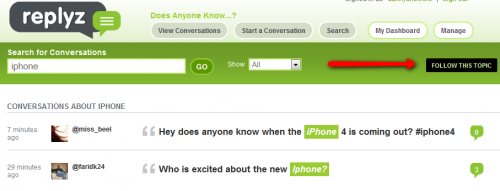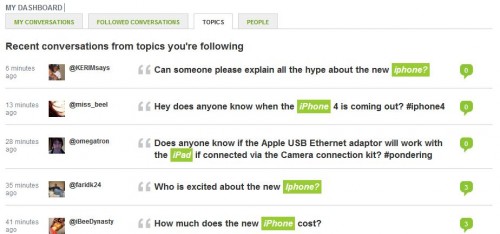Replyz: See The Questions People Are Asking On Twitter
People ask friends and followers lots of questions on Twitter. Now a new service called Replyz is making it easy to find all the questions being asked, answers being given and provides a platform allowing anyone to participate in question-answering on Twitter in an organized manner. It offers much to searchers and search marketers, alike. […]
People ask friends and followers lots of questions on Twitter. Now a new service called Replyz is making it easy to find all the questions being asked, answers being given and provides a platform allowing anyone to participate in question-answering on Twitter in an organized manner. It offers much to searchers and search marketers, alike.
Replyz is in a semi-private beta. Anyone can try it if they enter via a “conversation link,” which I’ll explain at the end of this article. The service mines Twitter for tweets that seem question-related, such as those containing terms like:
- does anyone know
- where can i
- can someone
- who is
- what are
It’s fascinating to watch the live stream of questions that come pouring in:

But Replyz is more than a voyeur service. It’s designed to help anyone ask questions or give answers beyond their existing social network on Twitter.
Answer Anyone’s Questions
For example, consider this person who asked his Twitter network about how to change the background on the Google home page, a new feature Google announced last week:
I answered the question, even though I don’t follow this person, nor do they follow me. Replyz made it easy. All I had to do was search for “google,” and I got a list of all questions that Replyz had found being asked by anyone on Twitter about the company:
See Answers From Anyone
You can respond to questions through Replyz, but you don’t have to. Replyz watches for any replies to a question and assembles them into a “conversation” even if they weren’t made using Replyz itself. For example, here’s someone asking for advice about what’s the best iPad case:
Replyz does this by watching who Twitter reports as having replied to a particular tweet, and then those responses appear as answers.
Your Dashboard For Q&A
Why bother using Replyz to reply? For one, the company hopes the My Dashboard feature will make your question-answering more organized.
“That’s the page we think will become someone’s home page, when they come back to the site,” said Matt Koll, one of the service’s founders. Koll is also an old hand in the search space, having founded search company PLS , which was purchased by AOL back in 1998. He also founded the Wondir search service and was an executive with Revolution Health.
For example, here I’ve done a search for “iphone,” which brings back results along with a “Follow This Topic” option that I’ve pointed at with an arrow:
You can follow any number of searches — topics, as Replyz calls them — which get managed through the Manage screen:
From the My Dashboard area, you can then see the latest results for all the topics you follow. In the example below, you can see questions about both the iphone and the ipad that have been found, mixed together:
Respond to any of these through Replyz, and an easy-to-reference record called “Followed Conversations” is created of your answers. Similarly, if you ask a question through Replyz, it keeps track of what you asked and any answers in the “My Conversations” area.
Replyz & Other Help Engines
Replyz is not alone in the question answering space, of course. Perhaps the biggest of the services is Yahoo Answers, which passed the one billion answer mark earlier this year. But Yahoo Answers relies on contributed answers from anyone, rather than from your trusted friends and others you know in some way.
That’s where services like Google-owned Aardvark (see Aardvark “Help Engine” Opens To Wider Use and “Help Engine” Aardvark Makes Twitter An Onramp For Q&A) and Quora (which I’ve just started using) come in. They’re designed to let you ask questions to more trusted group of people. However, that can also make them more limited. To ask questions or give answers, you have to be a member of those services. That’s yet one more network to join, in a world that already feels like it suffers from social network overload.
To me, Replyz strikes a nice middle ground. It taps into one of the biggest networks where people are already asking questions, Twitter (and support for Facebook is promised to come in the future). There’s nothing to jump start, no worries about trying to reach a critical mass of members.
Answers For Searchers
For searchers, Replyz offers a way to get answers beyond your trusted network. You can use it as a search engine to search for a question, apply the “Has Replies” filter, and see who has already gotten answers to a particular question:
Maybe if the service takes off, you’ll also find that your questions — whether issued through Replyz or just through Twitter — will bring back answers beyond your trusted network.
That’s would be nice, if it works, because while Twitter does produce answers for people, the quality and speed depends much upon your followers.
A interesting study released in April, What Do People Ask Their Social Networks, and Why? A Survey Study of Status Message Q&A Behavior (PDF format, and thanks to Keri Morgret for the tip), found that about 70% of questions asked on social networks were rated as helpful. That’s a great figure, but it still means 30% were not.
Of course, that study looked at answers from more than Twitter. I asked Koll if he knew how many tweets on Twitter are honest-to-goodness questions. His self-admitted guesstimate from a quick sampling of tweets was that about 5 to 10% of tweets are questions — and about 77% of those got no answers.
Trusted Answers For Searchers
Also from the April study was this:
The most common reason to search socially, rather than through a search engine, was that participants had more trust in the responses provided by their friends. A belief that social networks were better than search engines for subjective questions, such as seeking opinions or recommendations, was also a common explanation.
That’s similar to my unscientific poll I did last year, How We Search With The Twitter “Help Engine”. It also found that people want trusted answers. Social networks definitely provide this, but Replyz offers a new way for people to perhaps also get answers from others that they might decide to trust.
By the way, those interested in more about social search and getting answers from questions should also check out:
A Search Marketing Goldmine
Last month, I wrote an article called, The “Anyone Know” Search: How Twitter Is Good For More Than Brand Monitoring. It covered how answering questions on Twitter was a way to get past the customer service marketing that Twitter is so well known for and also use it to reach new people who may not know your brand or service.
That article explained that the key to mining Twitter in this way was doing searches designed to find people specifically asking questions about a particular topic. If you search for a topic without applying some type of “question filter,” you get results that are overwhelmed by noise.
This is what makes Replyz such a wonderful tool for marketers. There’s no need to create your own question filter. Replyz already does that work for you, so that you can search on any topic and get results full of questions. Some noise does leak through, but not enough to drown out the questions being asked.
Be Relevant, Get Welcomed
Will people react badly to uninvited answers from those they don’t know? Nope. At least personally, I’ve found good answers are welcomed.
For about a month now, I’ve watched for questions about topics like Google or Bing using my own “anyone know” question filter (described in my article above) and reached out to people using a special Twitter account, dannyanswers. The reaction has been positive:
To date, I’ve answered 42 questions, each with a link to more information from Search Engine Land. Not a single person has replied back with a complaint. Instead, 10 people specifically replied thanking me for the help.
Help is appreciated. Be helpful, be relevant with your responses, and I think question answering on Twitter can be an important new marketing venue. Be off-topic, fire off spam or some hard-sell pitch, and I think you will get complaints — plus complaints sent to Twitter’s spam team.
Answers, Not Spam
In particular, I’d encourage anyone thinking of answering questions through Replyz or in general to people they don’t know on Twitter to become familiar with these Twitter help pages:
The first warns that spam can be:
Abusing the @reply function to post unwanted messages to users
That can sound like you shouldn’t respond to people you don’t know at all. But anyone who uses Twitter knows that people respond to other people all the time. That’s where these lines from the second page listed are helpful:
- If your updates consist mainly of links, and not personal updates
- If you send large numbers of duplicate @replies
- If you send large numbers of unsolicited @replies in an attempt to spam a service or link
The common theme, to me, is that you should be unique and individual in your responses. They should be tailored to each person’s specific question. Fire off 500 “answers” that are all the same to different questions, and you’re inviting trouble. Use common sense and moderation, and you should be fine.
Accessing Replyz
Want to try Replyz? Visit the Replyz account on Twitter and click on any of the conversation links they tweet. That will prompt you to log-in using your Twitter account. Or, just click through to this “welcome” conversation on the service.
And how does Replyz plan to make money? For now, it doesn’t, Koll said. The goal is to build an audience first, then likely to carry ads along the side similar to what you see at regular search engines.
Contributing authors are invited to create content for Search Engine Land and are chosen for their expertise and contribution to the search community. Our contributors work under the oversight of the editorial staff and contributions are checked for quality and relevance to our readers. The opinions they express are their own.
Related stories
New on Search Engine Land







